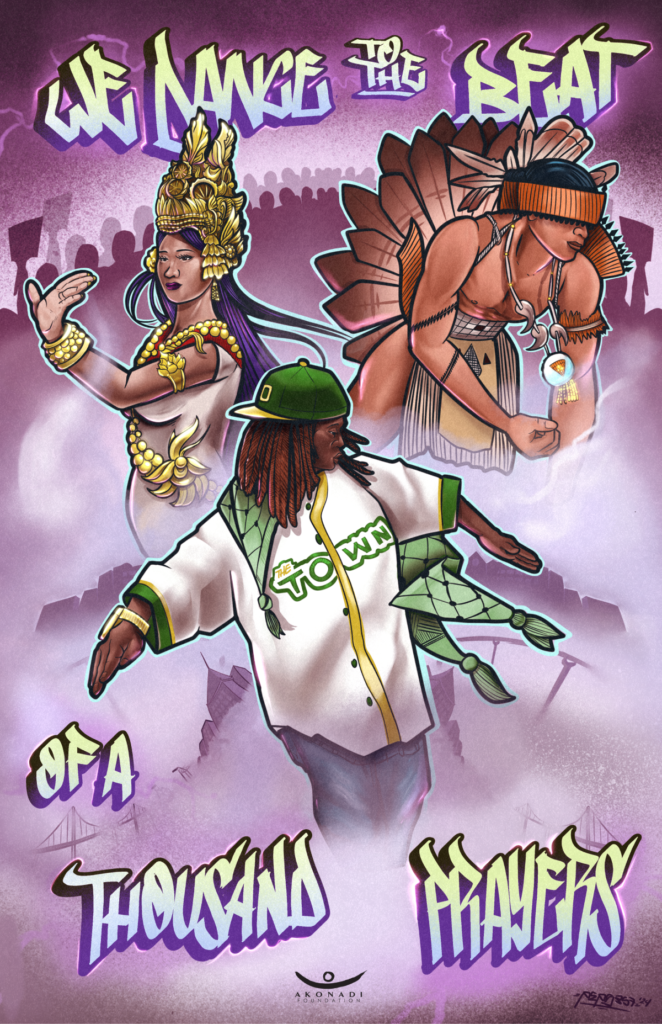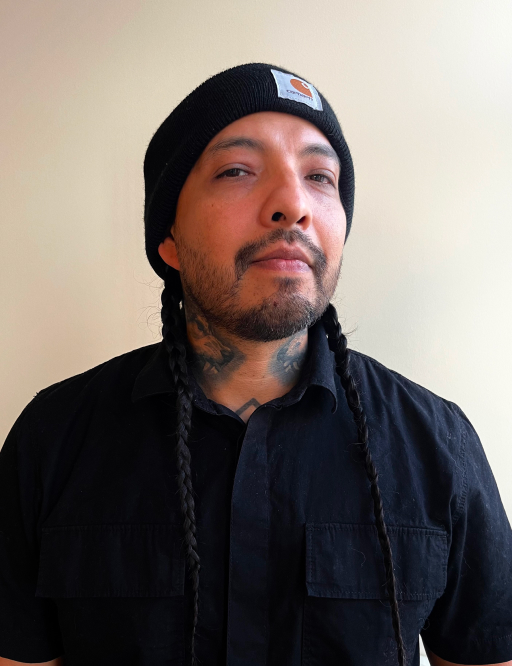In observance of March 21, the International Day for the Elimination of Racial Discrimination, Akonadi Foundation is delighted to present the 2024 Racial Justice Poster, “We dance to the beat of a thousand prayers” by Jose “Peps” Garcia.
Akonadi Foundation distributed our first Racial Justice poster in 2008 to commemorate March 21, the International Day for the Elimination of Racial Discrimination. This day honors the Sharpeville massacre on March 21, 1960, when the South African anti-apartheid movement rose up to resist `pass’ laws. As part of the government’s efforts to segregate and control Black South Africans, these laws required Black South Africans to carry passbooks, or identity cards, at all times. On this day in the Sharpeville township, as movement leaders, elders, and children gathered in peaceful protest, police opened fire and killed 69 people, including 10 children.
This year’s poster honors the unique political, social, and cultural contributions of Oakland’s Black, Khmer and Pomo communities and amplifies the importance of cross-racial solidarity. The poster serves as a reminder of our community’s ongoing and intersecting struggles and points to the need for us to invest in a shared vision for the next generation to achieve true liberation.
Help us spread the word about the poster through your social media channels. Please share a picture of yourself with the poster, using the hashtag #RJPP24 and tag us on Twitter/X at @akonadi_oakland and Facebook and Instagram at @AkonadiFoundation.
Artist Statement
This piece is titled “We dance to the beat of a thousand prayers.” It is an ode to the resilient collective cultural wealth and experience that is held in Oakland, one of the most diverse cities on the West Coast. The piece depicts dancers of Pomo, Khmer and Black heritages, set against a background of political protest and tear gas, dancing in unison towards liberation. In the midst of chaos, we witness poetry, dance, and paint rising in opposition to and defiance of the new “normal.” Oakland, as we all know, has seen decades of allied struggles for liberation, like the ones we see in Palestine, Congo, and Sudan today.
A remarkable moment of uprising and resistance took place after the extrajudicial killing of Oscar Grant on New Year’s Day, 2009. The streets of Oakland were filled immediately with crowds of people who had seen the violence happen, frame by frame, in video footage that was captured by eyewitnesses and shared widely. In response to the protests, we witnessed the Oakland Police Department becoming a militarized police force – part of a larger global trend of increased coordination between militaries and local law enforcement that increased with the War on Terror. The use of sonic, chemical, and other “less than lethal” tactics on Oakland residents mirrors the excessive state violence that has been and is currently being used to oppress people in Palestine’s Occupied Territories.
Turf Dancing, one of the most iconic styles of dancing that originated in Oakland, is the central figure of this poster because it was young Black men with boomboxes, dreadlocks, and scraper bikes who stood tall against the Oakland Police Department’s oppressive response to the uprising that followed Oscar Grant’s killing. Despite the tear gas, smoke, and sound weapons, they danced and raised their fists for justice.
Another figure in this piece is the often-overlooked Khmer community. Khmer people came to Oakland primarily as refugees who fled the genocide that was taking place in their homelands as a result of Western intervention and colonialism. Here in Oakland, Khmer and Southeast Asian communities have not only thrived culturally, they have become central influencers of Oakland’s cultural and political landscape. The Khmer dancer signifies the enduring sacrifice made to safeguard culture in the face of migration, conflict, and systemic homogenization.
The Native American dancer with Pomo traditional dance attire represents how Native people are still systemically and politically invisible to public perception, even though our communities have been at the forefront of every major social justice struggle in this country’s history. Despite overcoming genocide, slavery, forced displacement and persecution, the local Native Community in Oakland has reclaimed its space inch by inch, and dares to move beyond survival in a quest for freedom.
Biography
Jose “Peps” Garcia is an artist, father, and justice advocate who has been an Oakland resident since the age of 11. Throughout his life, Peps has always been grounded and inspired by great feelings of pride in his Indigenous culture and upbringing amongst Oakland’s grass-roots hip hop scene, which provided a great blend of culture and local flavor.
Through his education, Peps also became grounded in community work and developed a great drive to improve, educate, and beautify his community. He has been a member of a number of grassroots organizations such as the San Antonio-based Eastside Arts Alliance, The Black August Organizing Committee, Native Youth Movement, and the Xicana Moratorium Coalition, which strengthened his cultural and artistic ties to his community.
Peps also works with young people as an educator, most recently with “The Young Hawks,” one of Oakland’s most successful youth organizing and advocacy projects. Since 2017, The Young Hawks project has focused on violence prevention, advocacy, and direct intervention services with refugee and asylum-seeking youth under 24 from Latin America and the Caribbean.
Peps has painted over 15 murals in Oakland and in the surrounding Bay Area. He has been featured in the Oakland Museum of California’s exhibit, “Voices from Oakland,” and commissioned to work with artists such as Dead Prez, Erykah Badu, Floyd Redcrow Westerman and more.

